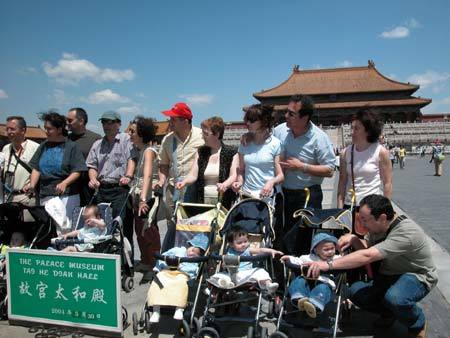IX-7 Question: Some overseas media have criticized China's new policies for imposing additional restrictions on foreign adoption of Chinese children. Why did China overhaul its adoption rules? What conditions should foreign adopters meet and what procedures should they go through to adopt children from China?
A: China has not changed its adoption regulations but has fine-tuned them to ensure that Chinese children adopted by foreigners receive better education and family care. The overseas media's inaccurate reports in this field have to some extent misled the international community, especially some foreign families with children from China.
In recent years, China has remarkably enhanced legislation on child adoption, improved related regulations, as well as standardized procedures and increased transparency in this field. As a result, a growing number of foreigners have applied for adopting Chinese children, with applications for this purpose to the Chinese authorities being on the rise. At the same time, the number of adoptable Chinese children has shrunk. This, plus increasing domestic adoptions, has greatly reduced the possibility for foreign adoption applications to be met and prolonged an applicant's average time of waiting for an interview with a prospective child to 14-15 months. Regarding this, some foreign organizations have suggested that the responsible Chinese agencies should categorize adoption applications in light of applicants' circumstances and sequence them separately. The Chinese Government accepted this proposal and decided to introduce new adoption application processing procedures as of May 1, 2007, to give priority to qualified foreign families. For instance, the new rules state that adoptive parents must be a married man and woman between 30-50 years old who have been married for two years if it's their first marriage, or five years if either of them had ever been divorced.
The policy adjustment is made to ensure Chinese children, especially those with disabilities, can be adopted by stable and well-off foreign couples, who are expected to provide them with sound medical treatment, family care and education. It can also shorten the waiting time of qualified adoptive families and facilitate China's adoption agencies to process applications in light of actual conditions at home and pick up prospective adopters with better conditions.
China has established cooperative relationships with 16 countries for intercountry adoption programs in the past decade, involving more than 172 foreign government agencies and adoption institutions. Foreign adoption has become an important alternative for bringing up orphaned Chinese children, especially those with disabilities. To safeguard the adopted children's rights and interests to the greatest extent, the Chinese Government has carried out strict qualification assessment of prospective adopters, carefully matched adoptable children and adoptive parents, and closely tracked the living conditions of the children in their new families. So far tens of thousands of Chinese children have been adopted by foreigners. With the meticulous care of their adoptive foreign parents, the Chinese children have shown sound physical and mental growth, while their legitimate rights and interests are effectively protected. Some ailing and disabled children have received timely treatment and rehabilitation training. In this sense, intercountry adoption marks a turning point in their lives.
The Chinese Government attaches great importance to children's sound growth and has established a relatively complete legal system based on practical objectives for juvenile population's subsistence, protection, development and participation in social life. More importantly, China's accession to the Hague Convention on Intercountry Adoption in 2005 has laid a solid guarantee for the country to deal with the issue in light of international practice and fully protect the adopted children and their parents. In the future, China's intercountry adoption programs will be consistently improved in perseverance with the “children first” principle, with the aim to become better conformed to provisions of related international conventions and actual national conditions, keep in stricter line with domestic laws and offer enhanced protection of the rights and interests of orphaned and disabled children.

(China.org.cn)